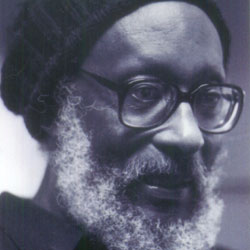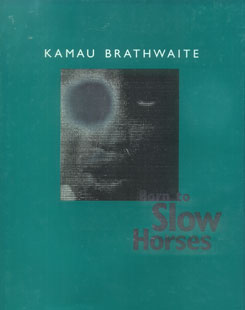Griffin Poetry Prize 2006
International Winner
Book: Born to Slow Horses
Poet: Kamau Brathwaite
Publisher: Wesleyan University Press
Click here to read and listen to an excerpt.
Click here to learn more about #40NightsoftheVoice, a special tribute to Kamau Brathwaite

Biography
Kamau Brathwaite, born in Barbados in 1930, is an internationally celebrated poet, performer, and cultural theorist. Co-founder of the Caribbean Artists Movement, he was educated at Pembroke College, Cambridge and has a PhD from the University of Sussex in the UK. He has served on the board of directors of UNESCO’s History of Mankind project since 1979, and as cultural advisor to the government of Barbados from 1975-1979 and again since 1990. Brathwaite has received numerous awards, among them the Neustadt International Prize for Literature, the Bussa Award, the Casa de las Américas Prize, and the Charity Randall Prize for Performance and Written Poetry. He has received Guggenheim and Fulbright fellowships, among many others. His book, The Zea Mexican Diary (1992) was The Village Voice Book of the Year. Brathwaite has authored many works, including Middle Passages (1994), Ancestors (2001) and The Development of Creole Society, 1770-1820 (2005).
Over the years, he has worked in the Ministry of Education in Ghana and taught at the University of the West Indies, Southern Illinois University, the University of Nairobi, Boston University, Holy Cross College, Yale University and was a visiting fellow at Harvard University. Brathwaite is currently a professor of comparative literature at New York University. He divides his time between CowPastor, Barbados and New York City.
We were saddened to learn of Kamau Brathwaite’s passing in February, 2020. As tributes pour in acknowledging Brathwaite, his work and his accomplishments, Barbados Today offers these moving reflections.
Judges’ Citation
“To read Kamau Brathwaite is to enter into an entire world of human histories and natural histories, beautiful landscapes and their destruction, children’s street songs, high lyricism, court documents, personal letters, literary criticism, sacred rites, eroticism and violence, the dead and the undead, confession and reportage. An epic of one man (containing multitudes) in the African diaspora, Brathwaite’s world even has its own orthography and typography, demanding total attention to the poem, forbidding casual glances. Born to Slow Horses is a major book from a major poet. Here political realities turn into musical complexities, voices overlap, history becomes mythology, spirits appear in photographs. And, in it what may well be the first enduring poem on the disaster of 9/11, Manhattan becomes another island in the poet’s personal archipelago, as the sounds of Coleman Hawkins transform into the words and witnesses and survivors. Throughout Born to Slow Horses, as in his earlier books, Brathwaite has invented a new linguistic music for subject matter that is all his own.”
Kamau Brathwaite reads from Kumina
From Kumina
the 21 days
on the first day
of yr death it is quiet it is dormant like a doormat
no one-foot touch its welcome. its dust on the floor
is not disturb nor are the sleeping spirits of this housei sit here in this chair trying to unravel Time so that it wouldn’t happen twine
on the second day
of yr death. i break a smallbread
i can still smell the sweet flour of yr firstborn flesh
on the third day
of yr death. the water in my urine turn to blood
i cover the waterfront of the mirror w/a blue cloth where yr face stoodon the fourth day
yu shd be rising. knocking at the door of
darkness. coming back to mei do not hear yr call
on the fifth day
after yr death. a young white rooster. white white white feathery & shining tail & tall
neigbour of sound from miles away in the next village
stands in the yard & from his red crown crows & crows & will not go awayhe struts round to the back-a-wall
his one eye clicking as he crowscomes to the glissen of my window & he crows
loud like the overflowing voice of my Trelawny
waterfallon the sixth day
after yr death. there is this silence of flowers
their petals say their shining needs
soft water needssweeet showers needs
sweet rain from heaven
•i see them once again inside the chapel of my funeral
on the seventh day
after yr death. the yellow flour
in the cup-cakes in the kitchen have gone sourthere is an eye of rancid in the middle of their meal
i am unhappy like the wind & tides are restless rivers
i can’t find you. i can’t find you. i cannot cannot cannot be console to dreamsthe mad dogs of the pasture kill the cock & pillage
it. madwoman wind is scattering white screaming feathers’ petals’ pedals over all
the brunt and burnin ochre-colour landon the eiate day
after yr death
me do nothin. nothin. nothin. i can’t even get yr inglish ‘eighth’ spelt straighton the nine /ff night
yu rise again from off the dead
•
i see you now & at the hour of yr o not soff not soffly deadit is my pain it is my privilege • it is my own torn flesh torn fresh
o let me comfort us my chile • is not yr heart is brokenon this tenth day
i haffe go down to the Station today to find out
what they doin about yr det. about the ‘accident’
dem call it. bout the black-hearted man who a-killyu. an whe dem hide yu body
and po. lice who dealin w/ this case they cannot look me in the lips
and No One knowhe the boy is or gone or when he will come-back
ten time dis ten dem mek me up & down & book & fourt
to fine my sun. an ten ten time dem ave no ansa for me for me for mein dis dry-weatha tunda
dem seh because i poor & have no book to haul-out
inside dis station. an i inn got no songto sing becau i colour in dis Marcus Garvey country proud an strong
an wrong – yu sun gone out & still you colour wrong.
inn got no i say songi wonda whe Port Royal is. when de eart goin again goin crack
my daughta Ingriid walk beside me hurt
an strong an dress in black
her face inside she face int mekkin sporton the tenth night after a long long distance silence
i born into this world w/ nothing but my breath & my bare back an hornets
in my chessnow i will haffe doubt if god is good & black & honesty
wha good good do fe me?
whe god dat cricket midnight criminal when Mark of god get call like dat & kill
Mark cyaan dead so if good. if godmy breath give birt to good like god
my sun dis gold is all my riches that cannot be replace
an suddenly me cannot fine him in dis place before dis good god face to face
wha good fe god. no god. what good. wha god. no god
if good Mark have no face to face dis god inside dis good god placeon the eleventh day after he dead
[Silence]on the twelfth day
after yr debt – o pickney – it is as if me cyaan wake up
Time has been drain from all my clocks. the sky is overcyas & lock
altho it isn’t rainin yet[Silence]
this night we hold our wake. watch w/ the spirit of my sum before his daily funeral
• people cook food bring bread & drink & there’s some singing
of the old traditions by the older folks & country citizensbut they soon fall to arguing and they soon fall down to quarrellin
about the words the phrases time & tempo of these sookey tunes
it seem they isolated in the old traditions in these coffee hillsFrom Born to Slow Horses
Copyright © 2005 by Kamau Brathwaite

5 Replies to “Kamau Brathwaite”